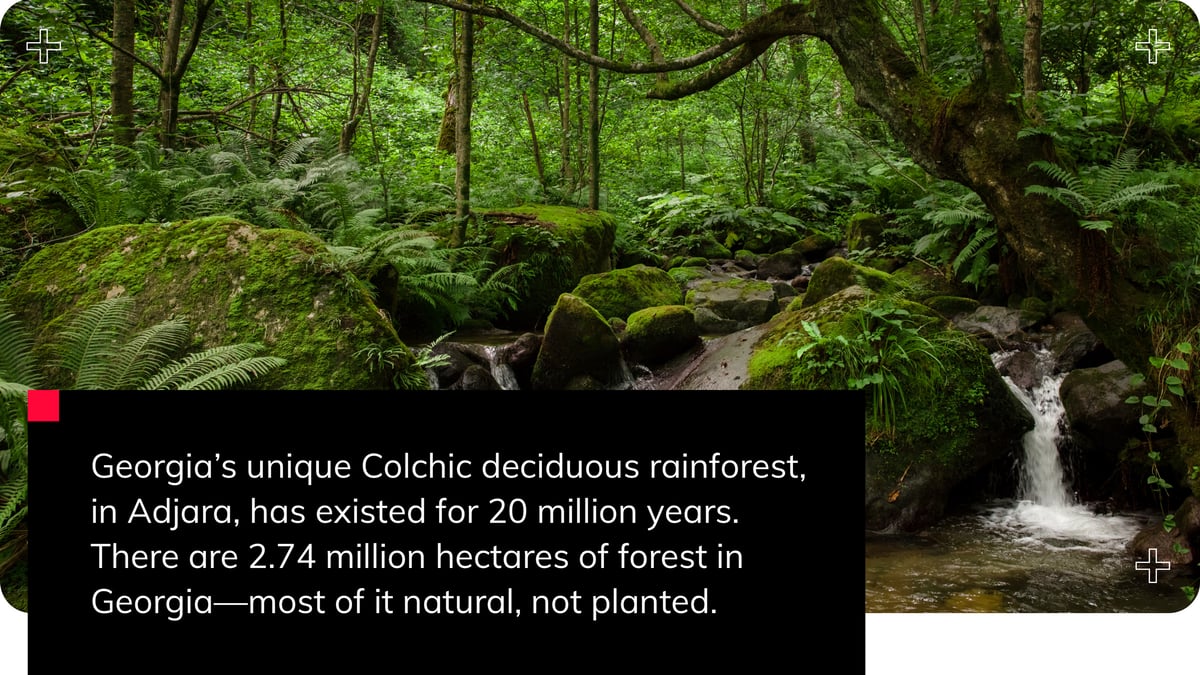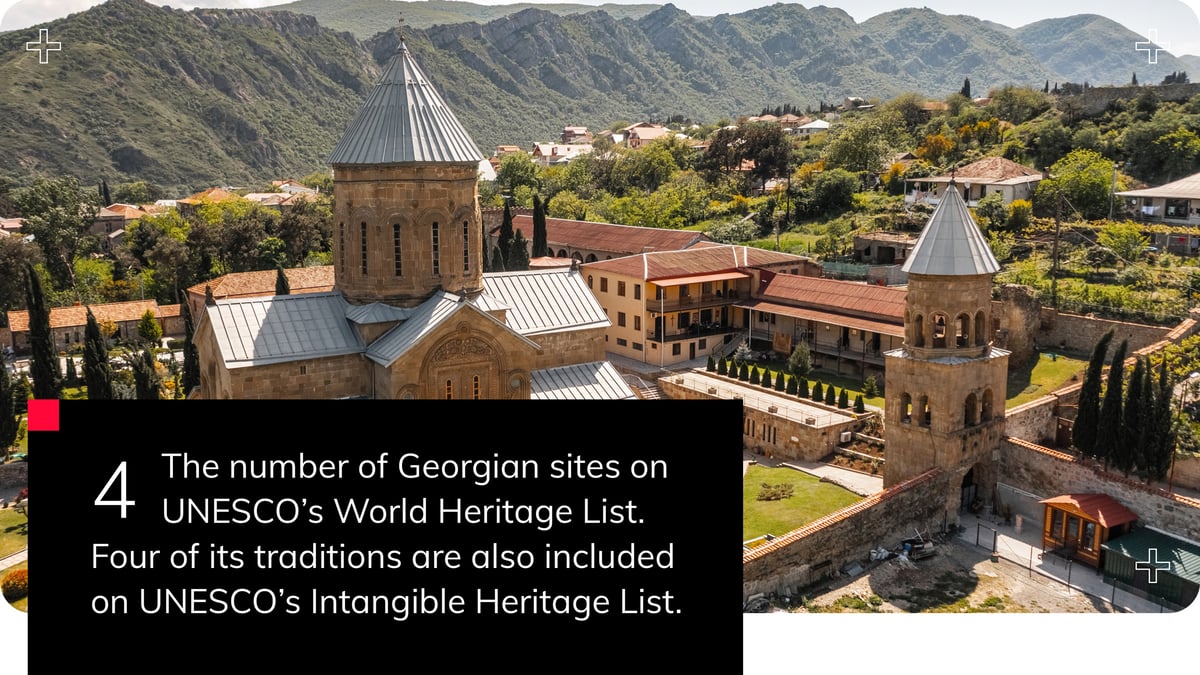A Place to Reconnect With Your Sense of Adventure
For visitors seeking new destinations, Georgia offers a dramatic location with year-round attractions beyond the well-worn tourist trails of Europe.
With international travel opening up once more, people are seeking the new and undiscovered. In the latest Bloomberg Media travel survey1, an overwhelming 61% of respondents declared that they were planning to explore new destinations. More than half are looking for adventure and want to immerse themselves in new cultures and cuisines, while 50% want to get closer to nature.
Georgia appears to be the perfect destination to satisfy this wish list. Visitors can expect a warm welcome, thanks to the country’s deep-seated culture of hospitality. A guest, the Georgian saying goes, “is a gift from god.”
What will first-time visitors find there, aside from friendly inhabitants? In this small country—half the size of the US state of Georgia, with which it shares its name—there is extraordinary natural, social and cultural diversity.

It’s hard to keep a good thing quiet: Tourist numbers in Georgia leapt by 66% between 2013 and 2018, and the annual number of international travelers reached 9.3 million pre-pandemic. To put that into context, Georgia’s population is a mere 3.7 million.
But while swelling tourism numbers have caused friction in some countries—in overexposed destinations such as Venice, Amsterdam and Barcelona—Georgia remains a relatively undiscovered, off-the-beaten-track nation, although there are direct flights to 53 cities.
Georgia is located at the crossroads of Europe and Asia, with its northern border dominated by the Caucasus Mountains. Many travelers are perhaps more familiar with the Caucasus in myth, as the mountains where the Titan Prometheus was chained as punishment for gifting fire to mankind.

The Caucasus chain is as long as the Alps (around 1,200 kilometers). More than half the country is above 900 meters in altitude, and, for serious mountaineers, five peaks are above 5,000 meters. On the country’s mighty slopes, a thriving winter sports scene has developed in places like Tetnuldi and Gudauri; while they may not have the fame of the Alpine resorts, they don’t have the prices and crowds of those skiing hotspots, either. The mountains’ high-altitude villages are dotted with perfectly preserved relics of Georgia’s history, such as the sublime Gergeti Trinity Church (Tsminda Sameba) and the epic Georgian Military Highway.
The mountains and ski slopes are one avenue of growth for Georgia, as it seeks to attract adventure travelers from their usual haunts in the Pyrenees, Rockies and Dolomites. One time of the year popular among visitors is early autumn, when wine grapes are harvested. The Rtveli grape harvest festival has probably been happening as long as Georgians have been making wine—8,000 years, which is longer than anyone else. But now, the beginning of the season can be experienced in an urban setting, at the capital city of Tbilisi’s New Wine Festival, in May.

Georgia will also appeal to experienced travelers looking for unique culture and a thriving wine and food scene. Visitors pressed for time—especially from countries like the US, with less generous vacation allowances—appreciate this smaller European country, where packing a lot into one trip, for less money, is a definite attraction.
This is especially true if an itinerary includes Georgia’s coast. The country’s mountains, historic cities and vineyards echo familiar European destinations such as Austria and northern Italy, but in Georgia, you can add beaches to the mix.
The Black Sea resort town of Batumi is just over 100 kilometers from the ski slopes of Goderdzi. It’s as different in topography and temperament from Tbilisi as, for example, Sorrento is from Florence, or Nice is from Paris. Like Nice, Batumi was a glamorous retreat for socialites and partygoers in the 1920s, and over the past few decades, it has reinvented itself as a city of daring architecture, art and festivals. It offers high-end hotels from international brands, and has invested in entertainment and sports venues.
Batumi is the capital of the Adjara region, where the Ottoman influence offers a distinctly different cultural and gastronomic experience than that of Tbilisi, which offers an enticing mix of old and new. Set in a dramatic valley, Tbilisi encompasses a picturesque old town, eclectic architecture, outstanding cuisine and an understated cosmopolitan vibe.

Tbilisi was founded in the 5th century and its narrow streets, lined with independent shops, help it retain a sense of the past. The 2000s brought a wave of innovation and energy that has made it a hub for artists, fashion designers and entrepreneurs. Sometimes referred to as the “new Berlin,” the city offers abundant music and fashion events, daring contemporary buildings and characterful boutique hotels.
For any visitor, the natural extension of a hospitable welcome is food. Khachapuri is a much-loved Georgian dish of bread with cheese, or try khinkali, dumplings most often filled with a brothy spiced-meat filling and, like all the best-tasting food, they're designed to be eaten by hand. Whatever you chose to sample from the country's extensive gastronomic menu, it all tastes better when accompanied with Georgian wine - the best way to connect the old with the new.
1. Now Boarding: A Global Travellers Outlook for 2022 by Bloomberg Media, N=1269
